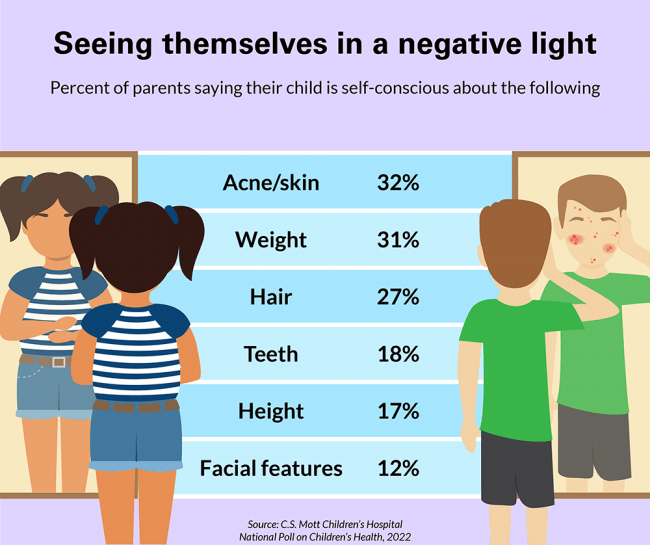ANN ARBOR, Mich. — Psychological well being points are a rising concern amongst younger kids and youths, in accordance with a brand new nationwide ballot by a group on the College of Michigan. In reality, two in three dad and mom say their little one feels insecure about their look. One in three dad and mom say their little one has been bullied or made enjoyable of due to their appears.
“Kids start forming opinions about their our bodies and appears at a really younger age,” says Susan Woolford, MD, MPH, a baby weight problems professional and pediatrician on the College of Michigan Well being C.S. Mott Kids’s Hospital and Mott Ballot co-director, in a college launch. “These findings reinforce analysis that as children obtain unhealthy messages about societal beliefs, it could actually result in a poor self-image of themselves. Left unchecked, a preoccupation with look and physique dissatisfaction could result in decreased psychological well being and emotional well-being and improve dangers for consuming issues, melancholy, and low shallowness.”
Feeling uncomfortable about appears and appearances can negatively influence an adolescent’s shallowness and doubtlessly breed physique picture points. Within the ballot, one in 5 dad and mom say their teenage kids dislike taking photos as a result of they really feel self-conscious.
The C.S. Mott Kids’s Hospital Nationwide Ballot surveyed 1,653 dad and mom with a minimum of one little one between the ages of eight and 18. Widespread causes for these insecurities included weight points, pores and skin situations akin to pimples, and dissatisfaction with their hair. Mother and father word that their kids have been much less prone to really feel awkward about their top or facial options. Nonetheless, one in 5 dad and mom of women add their little one felt self-conscious about their breasts.

Being a teen could be probably the most troublesome time
Mother and father have been extra prone to report that their little one felt insecure about their look after they have been a teen compared to after they have been eight to 12 years-old.
“As children become older, they turn out to be extra self-aware, usually tend to examine themselves to friends, and could also be extra influenced by media portrayals about magnificence and probably the most fascinating physique form, face, and look,” says Dr. Woolford. “It’s developmentally regular for adolescents and youths to expertise some insecurities, but when it’s interfering with their capability to take pleasure in social interactions or different actions, they might need assistance.”
A few third of fogeys noticed their kids making destructive feedback about their appears. For fogeys with self-conscious kids, one in three imagine their look possible is impacting the kid’s shallowness. One other one in 5 dad and mom suppose their little one’s low self-confidence is hindering them from participating in sure actions.
Particularly with teenagers, dad and mom say their little one tries to treatment the state of affairs by actively avoiding being in photographs, protecting themselves with clothes, or proscribing what they eat. These insecurities could also be fueled by destructive feedback coming from others. One in three dad and mom says their kids’s look has been mocked or commented on by their friends, strangers, or different relations. The commonest parental response is to speak concerning the incident. Mother and father have been much less prone to actively defend their little one from the individual making the hurtful statements or the individual making the feedback.
How can dad and mom change the physique picture dialog?
Primarily based on the findings, Dr. Woolford recommends that folks comply with these solutions. First, function mannequin self-love by not making destructive feedback about their very own look and as an alternative vocalize appreciation for the highly effective issues your physique does, akin to taking you on walks or swimming.
“Children are watching each time you step on that scale and sigh about needing to drop pounds or level out your individual perceived flaws within the mirror,” the researcher says.
Second, train kids the way to embrace physique variety positively, whether or not in individual or on tv. Nonetheless, Dr. Woolford says it is best to keep away from giving compliments on an individual’s magnificence. Even when well-intentioned, the reward reinforces the message that bodily look is essential.
Households also needs to work in the direction of redefining what it means to train and get good diet. Shifting the mindset from consuming and figuring out for the aim of wanting good to feeling good could assist with stopping unhealthy weight-reduction plan sooner or later. Having common household meals may hold dad and mom linked to children and encourage an open dialogue on what’s occurring of their lives.
Lastly, dad and mom ought to restrict social media utilization to keep away from comparisons to unrealistic, filtered photographs from influencers and celebrities.
“Mother and father can train their kids to be media literate and savvy, in order that they perceive that these portrayals of the right physique, face and look in commercials, media and even from their very own associates doesn’t replicate actuality,” Woolford concludes. “By laying a powerful basis of wholesome attitudes, dad and mom may also help their kids develop a constructive physique picture via youth and maturity.”
